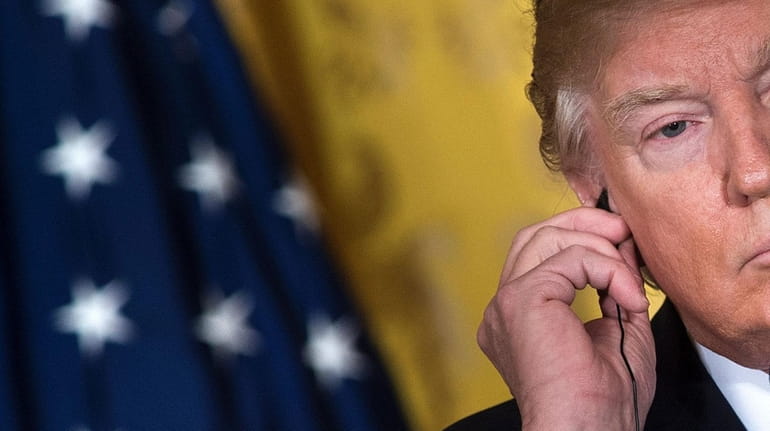5 ways Trump can more effectively use diplomacy

President Donald Trump listens to a translation of Japan's Prime Minister Shinzo Abe's comments during a news conference in the White House in February. Credit: AFP/Getty Images / BRENDAN SMIALOWSKI
American diplomacy is complex. In every president’s foreign policy toolbox you find an array of sophisticated techniques and approaches to manage global relations in ways that protect the homeland and advance U.S. interests and values around the world.
One hundred days into Donald Trump’s presidency, it seems a few of those tools are missing. Here’s a look at what this president still doesn’t seem to understand:
1. The military is only one tool, albeit a powerful one. Military might — boots on the ground or missiles in the air — is only useful if accompanied with a well-thought out diplomatic strategy. For example, bombing Syrian airfields, as Trump did earlier this month, might feel good for a day or so. But what happens after the costly use of force? Absent a diplomatic strategy for dealing with Syria, Trump is left without a trump card in the Middle East. Sending ships to the Pacific Ocean is a sure show of force, but it is not likely to impress the government of North Korea. Even those high up on the Department of Defense hierarchy agree that without diplomacy, the militarization of foreign policy likely won’t yield positive results.
2. Traditional diplomacy is nuanced, sophisticated and multi-dimensional. It takes people and institutions. Having Trump yell at the North Korean government will not likely slow down or stop the regime’s nuclear program. It takes regional pressure and intensive talks with all the parties, as well as a mix of sticks and carrots. Absent the full cooperation of countries at the United Nations and in the Asia-Pacific region, bullying won’t get us anywhere. The United States needs to talk with the leaders of countries in the region in a serious, substantive manner that doesn’t alienate Europe. In the midst of a major influx of refugees to Europe, the United States shouldn’t be dismissive of NATO.
3. Public diplomacy means more than tweeting. Citizens matter. It is critical for America to build global support for its foreign policy. The United States has ways to build international support for its values and interests — including cultural exchanges, international education and foreign assistance. But Trump’s proposed federal budget is determined to cut those programs. Without staff and money, America has little leverage with overseas audiences whose voices can make a difference when it comes to building democracies. Decreasing our contributions to the UN or the World Bank, for example, won’t help.
4. Economic diplomacy is more than job creation. We have financial pressures like sanctions that can be applied to Russia — sanctions that might cause Vladimir Putin to rethink his bad behavior. When sanctions were placed on Iran, for example, the United States was able to slow the pace of its nuclear program. Conversely, economic incentives can often motivate a nation in a direction that is friendly to U.S. interests. When institutions like the Overseas Private Investment Corp., a U.S. government agency, funds projects in Africa, Latin America, the Middle East and elsewhere, the United States creates opportunities for individuals. That investment leads to more stable countries. But all of this works only if the organizations are actually funded.
5. “Development” goes beyond real estate. Development, including foreign assistance, means building up the institutions of a civil society — independent media, rule of law, entrepreneurship, religious tolerance and basic individual freedoms. Cutting funding for the State Department and the U.S. Agency for International Development would deeply undermine America’s ability to advance peace and prosperity.
Our foreign policy toolbox is powerful and persuasive. Now we just have to convince our president to use it.
Tara D. Sonenshine served as undersecretary of state for public diplomacy and public affairs 2012 to 2013.
